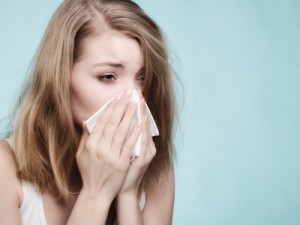There are over 200 types of virus that can cause a cold, making it one of the most common suffered illness anywhere in the world.
So whether you’re traveling to see family and friends or they are coming to see you, sneezes and sore throats are sure to greet you. On top of that, you’ve got final exams, meal preparations, last minute gift purchases, etc. to attend to.
It co uld be all of that work before the holiday “break” that spikes a stress hormone in your body called cortisol. Cortisol is a natural hormone that responds to stress, lowering immunity and making you more susceptible to infections.
uld be all of that work before the holiday “break” that spikes a stress hormone in your body called cortisol. Cortisol is a natural hormone that responds to stress, lowering immunity and making you more susceptible to infections.
With all of the upcoming holiday traditions and events, this means you’re indoors with crowds and exposed to everyone’s germs. As people gather indoors, they use the same doorknobs, banisters and surfaces after wiping their noses or sneezing.
During the winter season we’re more susceptible to these things. Why? Because with the cold weather, people tend to get less fresh air. You are less likely to open a window or go outside, making the virus more easily spread.
Long flights actually pose a much higher cold-infection danger. The confined cabin of an airplane provides the ideal environment for spreading airborne diseases like the common cold. With up to 200 potential sources of infection at such close quarters , the chances of the infection being spread through the re-circulated air are extremely high.
You can prepare your immune system by keeping your vitamin D and vitamin C levels up. Unfortunately, steering clear of all the delicious pies, cakes, and cookies is a good idea. The sugar they contain actually inhibits phagocytosis, a process by which the body uses white blood cells to attack foreign invaders.
Tips to prevent colds caused by holiday stress:
- Stress might be unavoidable, but try getting enough sleep and hydrating.
- Prevent the stress hormones from wreaking havoc by better planning, avoiding traffic, buying presents earlier.
- Get your flu vaccine
- Make sure you wash the hands frequently and thoroughly and sanitize. The cold virus can survive for a few hours on a contaminated surface for example a door handle or telephone or just anything in an airport, which we can easily pick up and transfer to our nose and mouth.
- Don’t share eating utensils and food with anyone. This could help to handle the spread of colds as well as other common travel-related infections which has been picked up by your fellow travelers.
- Exposing yourself to excessive warm then going into the cold can have a negative impact on your immune system.
- Colds spread within crowded indoor environments, so remain aware of precautions you should be taking.
That being said, remember: the holidays are meant to be enjoyed. So slow down and be cautious; and if you do succumb to a virus, take action to begin getting well immediately (and avoid spreading your germs to others).
If you need to verify your illness or would like some help to feel better fast – visit us at Coastal Urgent Care !
